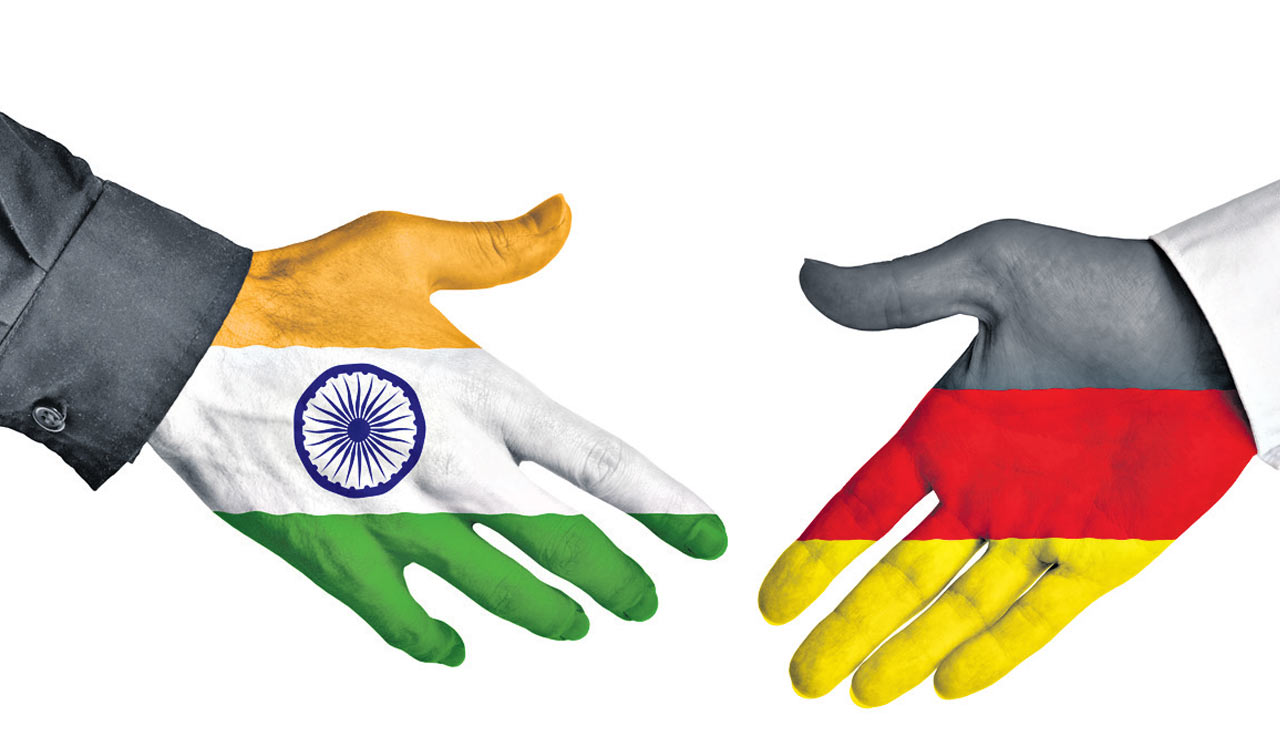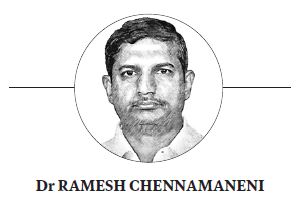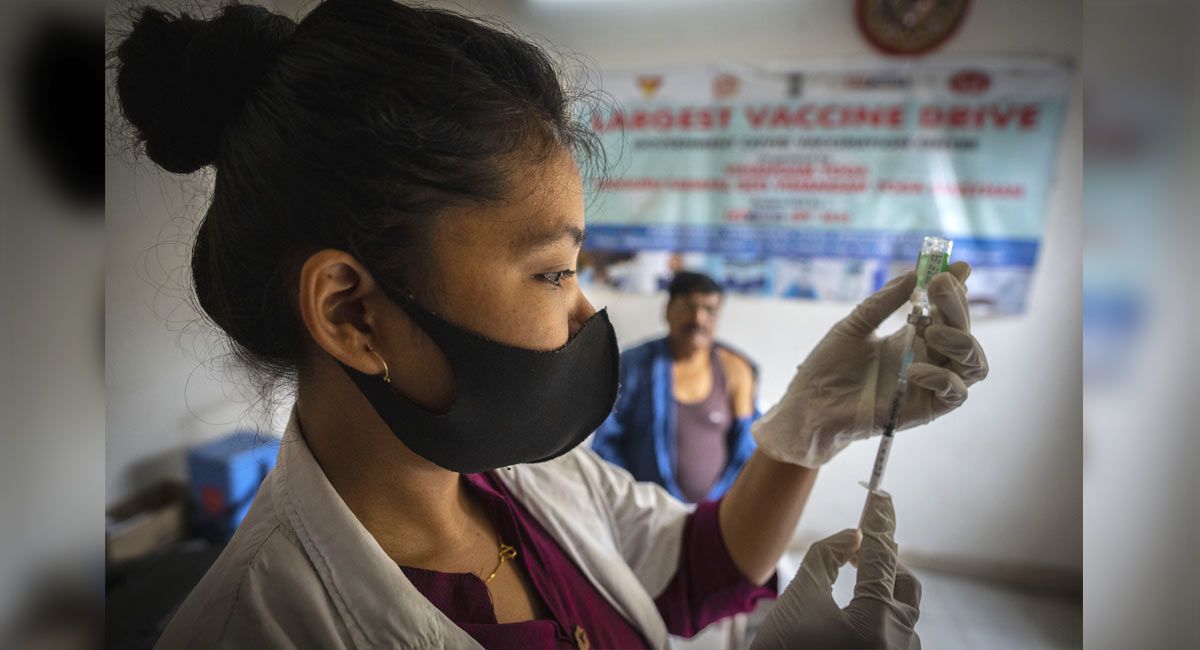Opinion: New chapter in Indo-German ties
‘Focus on India’ will help raise strategic partnership and strengthen bond between the two countries

By Dr Ramesh Chennamaneni
German Cabinet approves Focus on India“ Strategy
Chancellor Scholz visiting New Delhi with high power delegation
German cabinet under the leadership of Chancellor Olaf Scholz on 16th October approved its highly ambitious „Focus on India“ strategy, days ahead of his high powered delegation comprising of atleast 8 cabinet ministers to New Delhi to meet and discuss with Prime Minister Naredra Modi and his Government during 7th Indo-German consultations.
It was a bright autumn sunny afternoon in Berlin on Monday 14th October at Olympia stadium in Berlin, a place where Indian students and professionals meet to play cricket. Telangana Association of Germany (TAG) has been organizing this sport since last one decade. But this time a very special guest is expected to watch their game and interact with them. It was non other than German Federal Minister for Labour and Social Affairs, Hubertus Heil. During this interaction, the minister announced that his government would present the Skilled Labour Strategy at German-Indian government consultations in India. Over 30 measures, aimed above all at reducing the bureaucratic hurdles involved, for example, in the granting of visas, are to make it easier for Indians to come to Germany. A shortage of skilled workers is looming in Germany, whereas the opposite is the case in India, according to the German government. That’s why Germany sees “India as a particularly important partner in the area of skilled labour immigration” the minister opined.However, this is not the only area of close cooperation Germany proposed in its „Focus on India“ strategy.
Focus on India
The preamble of this „Focus on India“ strategy approved by the German cabinet and released to the press says that as the world’s fifth-largest economy, India already plays a key role in global efforts to protect our climate and biodiversity and to achieve the Sustainable Development Goals set out in the 2030 Agenda. It says, in a region in which the principles of the UN Charter, international law and the rules-based international order are coming under pressure, India is a stabilising influence. The country also plays a central role for Germany as a source of well-qualified skilled labour.
Announcing that Germany wants to intensify its strategic partnership with India, it has adopted a key strategic document „Focus on India“which sheds light on the future direction of bilateral relations between the both countries. The German Government would like to raise the strategic partnership that has underpinned relationship with India since 2000 to a new level. The first steps towards implementation of this strategy are to be agreed at the forthcoming Indo-German intergovernmental consultations at the end of this month.
Incidentally, the strategic partnership of Germany with India will celebrate its 25th anniversary next year. In announcing this „Focus on India“strategy, the German Government wants to encourage a stronger awareness of India among stakeholders from business, academia, media and society, as well as the federal states, to reflect the heightened importance of the country. The document further emphasises that the rapidly growing community of Indian people in Germany is building a valuable bridge leading to a better understanding of India in Germany and also has the potential to transport a positive image of Germany to India.
Focus on India covers the entire spectrum of bilateral Indo-German relations, also taking into account Europe’s India policy. Priorities include cooperation in the area of foreign and security policy, development cooperation, climate and environmental protection, expansion of business and trade relations, intensification of cooperation in the field of research and academia, and recruitment of skilled labour. The paper likewise emphasises the importance of exchange on basic values and fundamental rights, for example within the framework of the human rights dialogue between the European Union and India.
The document also says that „2024 parliamentary elections in India impressively demonstrated the vitality of the world’s largest democracy. The Bharatiya Janata Party managed to win a relative majority of the votes and was able to form a government once again, while the opposition emerged from the elections stronger. Nationalist movements based on religious ideology remain infuential in India. In their extreme forms they also call for restrictions on the civil liberties set down in the country’s constitution. We also take these tendencies into account in shaping our partnership with India. That also applies to divergent positions on foreign policy issues of crucial importance to Germany. At the same time, we can glean important insights from India’s perspective on Germany’s positions.“
Priority Goals of Focus on India
- We want to promote a new perspective on India which centres on the great opportunities and potential of further intensifying our bilateral relations.
- We want to assert our interests more effectively in an increasingly complex global environment by cooperating closely with India as one of our global partners, andto make use of India’s prominent role in the so-called Global South in shaping oforeign policy.
- We want to be a reliable security partner for India. This includes exchange and cooperation on arms-related issues.
- We want to work with India towards achieving the goals of the Paris Climate Agreement, the Sustainable Development Goals and the Global Biodiversity Framework.
- We want to proft more from India’s innovative strength as well as its technological, economic and skilled labour potential, in order to be better able to respond togeo-economic challenges.
- We want to intensify the German Government’s systematic engagement with India inall its facets and foster a stronger perception of India commensurate with its signifcance in the spheres of business, academia and society.
- We want to create the framework conditions necessary to enable us to shape our relations with India more coherently and take them to a new level. To this end, we want tostrengthen coordination with stakeholders in Germany and Europe.Development cooperation policy, climate and environmental policy
Within the Indo-German strategic partnership, the Indo-German Green and Sustainable Development Partnership, which was agreed in 2022 by Prime Minister Narendra Modi and Federal Chancellor Olaf Scholz in Berlin made substantial progress.The German side could provide concessional loans through its Bank for Development (KfW), to set up the infrastructure and cover high investment costs and has previously invested one billion Euros in the energy transformation in India, primarily focusing on the financing of photovoltaic systems, power lines and open space facilities. Other forms of potential cooperation are the provision of technical expertise and training for the installation, maintenance and management of solar energy systems and storage solutions, as well as advocating policy support at the state level.
It is within this context that a important meeting towards cooperation named RE-INVEST renewable energy investors’ conference, with Germany being a partner country, took place from 17th to 20th September 2024 at Gandhinagar, Gujarat recently. It is an expert forum attended by large number of high-level political and entrepreneurial representatives from all over the world inaugurated by the Prime Minister Narendra Modi.The Prime Minister said that, despite being a developing country, India has achieved its climate commitments set in Paris nine years ahead of the target. He said India has made its green transition a people’s movement. He added, that with PM Suryaghar Muft Bijali Yojana, every home in India is set to become a power producer.
German Minister for Economic Cooperation and Development,Svenja Schulze, accompanied by a business delegation representing 20 small and medium-sized German enterprises from the renewable energy industry at this meet, has launched along with Minister for New and Renewable Energy, Prahlad Joshi “India-Germany Platform for Investments in Renewable Energy Worldwide”. It is aimed at bringing together German and Indian companies in the field of renewable energies and generating investment for the global energy transformation. There are already more than 2,000 German companies with representations in India. Some 200 German companies from the energy sector have trade relations with India, 50 have set up production facilities or subsidiaries in India.On this occasion Minister Schulze said “the Indo-German cooperation on the energy transition is a success story for all sides. The most populous country on Earth is on track for a boom in renewable energy and wants to become the second-largest producer of solar systems after China. First and foremost, this is good for India which can thus provide affordable renewable energy for its people, create millions of new jobs and contribute to clean air and a more stable climate. Germany, too, can benefit from this boom: German companies are investing in India. Associations are setting up exchange programmes for experts and German importers will finally have an alternative to sourcing solar systems from China. But ultimately the entire world will benefit if India accomplishes an energy transition. Climate change can only be stopped if more and more of the 1.4 billion people in India get their power from wind and solar energy.”
Given this background, India, as the world’s third largest emitter of greenhouse gases, has to accelerate its energy policy to achieve the objectives of the Paris Agreement and specifcally the goal to keep global warming below 1.5°C. As we know the livelihoods of the rural population depend predominantly on agriculture. The pressure on ecosystems and natural resources such as forests, water and soil is already very high due to the growing need for resources, intensive farming, rapid urbanisation and industrialisation, and is exacerbated by the climate crisis. The climate crisis also makes urban areas extremely vulnerable, Indian cities rank among the places with the highest levels of air pollution in the world.
As Germany, India has to create strong and transparent policy dialogue on climate change issues with its federal states, local government and civil society instituions. This is particularly important because the risks of climate change, driven mainly by the consumption of fossil fuels, necessitate a fundamental shift in energy consumption patterns, leading to a low-emission society: implying massive changes in many domains, e.g. energy ‘production’, mobility, food production, small scale industry, domestic energy consumption and most importantly needs behavioural changes, citizens have to play a bigger role in the transformation of the energy system.
Though Germany ranks second in global renewable energy production after China with India close to Germany, German local consumers of power are increasingly becoming prosumers (energy consumers who also produce energy) and are increasingly engaging in collective energy actions, including taking part in energy communities. There are 847 energy cooperatives in Germany. 220,000 citizens are involved in energy cooperatives. 80% of energy cooperatives operate photovoltaic systems. 8.8 terawatt hours of green power were generated by energy cooperatives in 2020.Aside from allowing the process of energy generation to take place where it is needed and where it is practical to do (sunny regions vs windy regions) as well as allowing citizens to actively engage in the process, cooperatives lead to more transparent, and fairer, energy prices for both the prosumers and end-consumers if the energy created is fed into the grid.
Telangana state represented by its Deputy Chief Minister Mallu Bhatti Vikramarka has participated at the RE-INVEST Meet at Gandhinagar in Gujarat. He has announced that the state has decided to give utmost priority to solar power and invited investors and innovators. He said Telangana has potential to generate 26.4 gigawatts (GW) of solar (40 GW of renewable energy) and invited 40 companies and directed officials to organise a meeting in Hyderabad with the investors such as German GIZ, Tata Power, Sen Carb and others who have shown interest in investing in the state. Here too, Telangana must explore the possibilities of involving its very strong rural and urban cooperatives and rural women organizations in the energy transition efforts through solar and other renewable energy sources.

(The author is former legislator and Government Adviser)
Related News
-
19-year-old Sam Konstas all set to make Test debut for Australia at MCG
-
Boxing Day Test: Rohit opens up on his batting position, Kohli’s form
-
TOMCOM organises special training program for placement of staff nurses in Germany
-
Representation of women in media is one-dimensional: Filmmaker Payal Kapadia
-
Telangana techie loses Rs 4.15 lakh to online gold trading fraud
4 mins ago -
Hyderabad: Couple working as house help at doctor’s residence held for theft
19 mins ago -
Hyderabad auto driver foils attempt to kidnap young woman, five held
1 hour ago -
Haiti gang attack on journalists covering hospital reopening leaves 2 dead, several wounded
2 hours ago -
21 dead as Mozambique erupts in violence after election court ruling
3 hours ago -
Cartoon Today on December 25, 2024
10 hours ago -
Sandhya Theatre stampede case: Allu Arjun questioned for 3 hours by Chikkadpallly police
11 hours ago -
Telangana: TRSMA pitches for 15% school fee hike and Right to Fee Collection Act
11 hours ago




